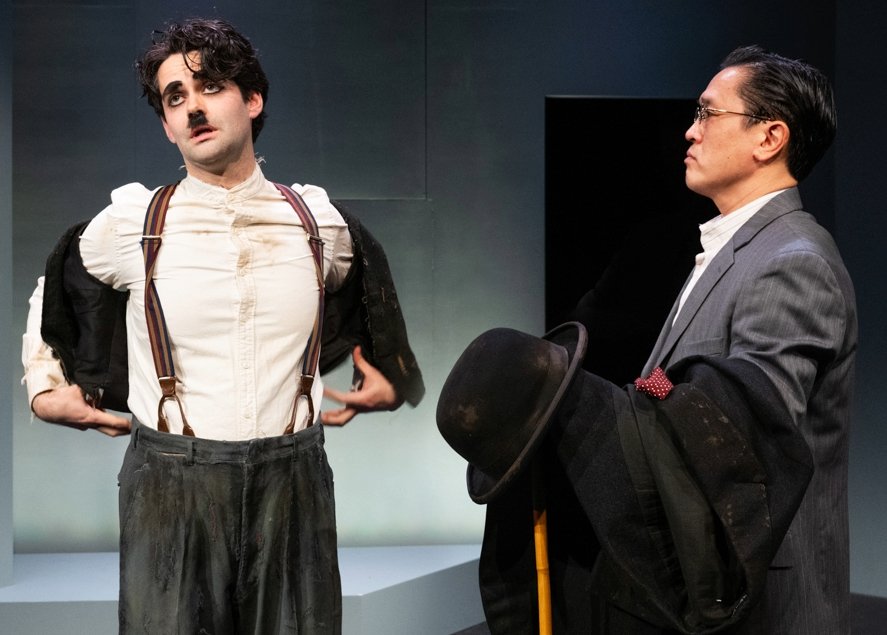Two assassins (Cody LeRoy Wilson and James Patrick Nelson) have at Prime Minister Inukai (Jae Woo).
With My Man Kono, now premiering at Pan Asian Repertory, playwright Philip W. Chung has an interesting story to tell. He tells it dutifully, thoroughly, and for the most part clearly. But not excitingly. Chung has done his research. His title character, Toraichi Kono (Brian Lee Huynh), was a Japanese immigrant who made it to the United States in the early 20th century and rose to a position of relative wealth and importance, then saw his fortunes dramatically reverse.
The prosecutor (Kiyo Takani) and Al Blake (Cody LeRoy Wilson) have it in for Kono.
Consider a brief outline of Kono’s life: Born outside of Hiroshima in 1885, he made it to the U.S. by about 1903, married a woman named Isami (Kiyo Takami, who mumbles—you may miss half her lines), his sweetheart from back home, and advanced about as far as a Japanese émigré could in the first years of the 20th century—partly by lying his way through financial and emigration scraps, but mostly by becoming right-hand man to Charlie Chaplin (Conlan Ledwith). As such, he chauffeured, acted as valet, and secured abortions for the young actresses whom Chaplin was regularly diddling. But the two had a bad falling-out, around the time of Modern Times. Which left Kono unprotected as Al Blake (Cody LeRoy Wilson), a louse whom Kono had brushed aside as Blake tried to get him to secure a meeting with Chaplin, drummed up some wartime espionage charges against Kono.
Kono ended up as the subject of a lengthy government investigation on the charges. Eventually cleared of them—and Chung sure takes his time spelling out the details—Kono returned to Japan in the services of his defense attorney, Wayne Collins (Robert Meskin), who made it his life’s work to help Japanese immigrants.
“Chung is singularly determined to highlight the injustices still perpetrated on immigrants such as Kono.”
An eventful existence, no? Kono lived the American dream until he didn’t, and his life story should be the stuff of trenchant observations about still-extant stereotypes and prejudices. But too much of Chung’s play feels perfunctory. His narrative shifts somewhat confusingly among eras. He delivers the facts but doesn’t delve into them, preferring to overload his narrative with details.
The chronology jumps around, but most of the first act is given to Kono’s rise, and most of the second act is his 1947 hearing, with Collins and a prosecuting attorney (Emma Kikue), Blake, and other witnesses testifying. Even J. Edgar Hoover (James Patrick Nelson) makes an appearance, looking and sounding not much like J. Edgar Hoover. So do various Chaplin women, most prominently Paulette Goddard (Kikue), whom Chaplin differentiates from his past conquests with, “They were girls; Paulette is a woman.” (She was 23 at the time.) Previous spouse Mildred Harris and co-star Virginia Cherrill are painted as grasping bitches, and it’s difficult to find historical evidence to support that.
Chung is singularly determined to highlight the injustices still perpetrated on immigrants such as Kono, as he writes in his program note: “Sadly, here we are, once again facing the same issues that Kono confronted eight decades ago: anti-immigrant sentiment, the ‘foreigner’ as a danger to ‘real’ Americans, and the threat of deportation to a country that’s not your home.” Those are good points, and a worthy objective, although an overly familiar one in the theater right now, and Chung is generally unable to present his argument compellingly.
How Kono (Brian Lee Huynh) advanced: By being right-hand man to Charlie Chaplin (Conlan Ledwith). Photographs by Russ Rowland.
The story is not helped by Sheryl Liu’s cold, gray, barely-there set (a bench, a window, not much else). Karen Boyer’s costumes and Asami Morita’s lighting do exhibit some character, as does Cinthia Chen’s projection design, including some useful old film footage—and a recurring projection of falling autumn leaves, perhaps an allusion to the Japanese fondness for seasonal imagery, but its meaning isn't immediately clear.
You won’t find a lot of great acting on the Pan Asian Rep stage, though Ledwith’s Chaplin gets the Little Tramp look and performing gestures exactly right, as well as suggesting the ego and tunnel vision that dogged the great filmmaker’s later existence. Also welcome is Meksin’s forthright Collins, who describes his selfless support for his clients as, “I suppose I was raised to be a good ole patriotic American boy,” a welcome sentiment in times like these. But Jeff Liu’s direction encourages overacting in several roles.
Then there’s Huynh, whose performance of the title character crystallizes some of My Man Kono’s shortcomings. He hits every emotional mark—Kono’s pride, his humiliation, his abiding love for his wife and children, his confusion about how America welcomed, then eventually betrayed, him. But he never offers us a look into Kono’s soul.
My Man Kono runs through March 9 at A.R.T./NY Mezzanine Theatre (502 W. 53rd St., 2nd floor). Evening performances are at 7 p.m. Tuesday–Saturday; matinees are at 2:30 p.m. Saturday and Sunday. For tickets, visit ci.ovationtix.com/252/production/1219657.
Playwright: Philip W. Chung
Director: Jeff Liu
Set Design: Sheryl Liu
Costume Design: Karen Boyer
Lighting Design: Asami Morita
Sound Design & Original Music: Howard Ho
Projection Design: Cinthia Chen





